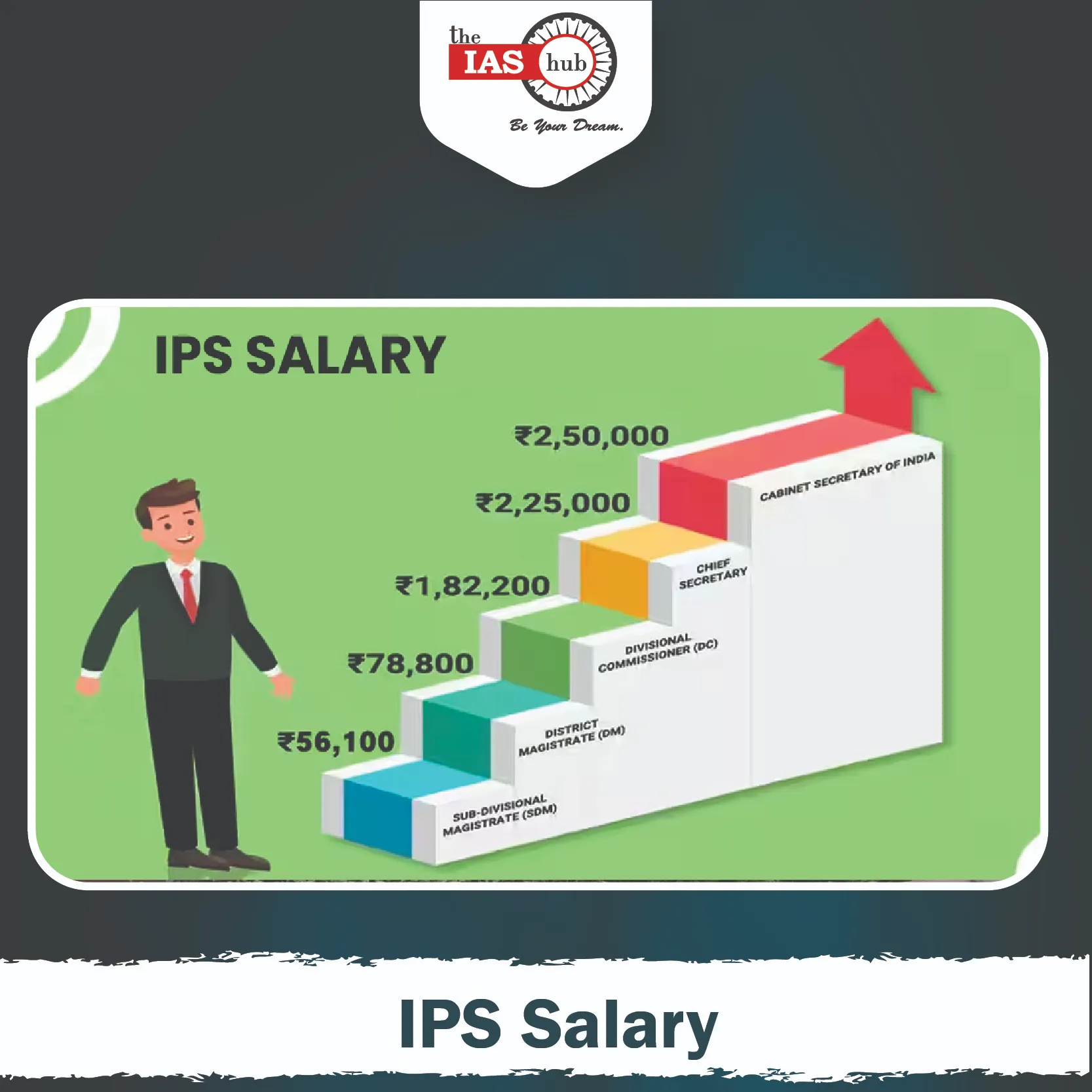Explore the salary and benefits of IPS officers, including rank-wise pay, allowances, and perks. Learn about career growth, allowances, and retirement pension.


IPS (Indian Police Service) officer is an essential part of India’s police force and plays a crucial role in maintaining law and order, preventing and investigating crimes, and ensuring the safety and security of the public. At higher ranks, such as Superintendent of Police (SP) or Director General of Police (DGP), they are involved in strategic decision-making, law enforcement policy formulation, and overseeing the police force’s operations.
The salary and benefits offered to IPS officers are quite attractive, making the career appealing. We will explore the monthly salary structure of an IPS officer along with additional perks and benefits they receive.
The salary of an IPS officer is determined by the 7th Pay Commission. According to this structure, the salary is divided into several components such as basic pay, grade pay, allowances, and perks.
Here’s a breakdown of the salary at various levels of the IPS rank:
| Salary Components | Entry-Level (Dy. SP) | Highest-Level (DGP) |
| Basic Pay | ₹56,100 | ₹2,25,000 |
| Dearness Allowance (DA) | ₹6,732 (12% of Basic Pay) | ₹27,000 (12% of Basic Pay) |
| House Rent Allowance (HRA) | ₹4,488 (8% of Basic Pay) | ₹18,000 (8% of Basic Pay) |
| Gross Salary | ₹67,320 (Basic Pay + DA + HRA) | ₹2,70,000 (Basic Pay + DA + HRA) |
| Deductions | Provident Fund, Insurance, Tax | Provident Fund, Insurance, Tax |
| Net In-Hand Salary | Gross Salary – Deductions | Gross Salary – Deductions |
| In-Hand Salary Approx. | ₹71,000 – ₹72,000 | Varies depending on deductions |
An IPS officer’s total monthly salary includes the following components:
Apart from the salary, IPS officers are entitled to several attractive benefits and perks, which add significant value to their overall compensation package:
Several factors influence the salary of an IPS officer:
Yes, IPS officers receive various allowances including DA, HRA, transport, medical, and special duty allowances based on their posting and responsibilities.
The salary of an IPS officer can vary depending on their posting location. Officers stationed in metropolitan cities or high-cost areas receive a higher House Rent Allowance (HRA) and may be entitled to additional allowances to cover the increased cost of living.
Yes, IPS officers posted in sensitive or high-risk areas receive Special Duty Allowance (SDA) and Risk Allowance to compensate for the challenging nature of their work, which can include exposure to violence or harsh conditions.
After retirement, an IPS officer is entitled to a pension that is typically 50% of their last drawn salary. The pension increases periodically based on government policy and the Dearness Allowance (DA) adjustments.


Refine your answer writing skills and elevate your UPSC preparation with personalized support and expert feedback.
Fill out the form to get started with the program or any other enquiries !








Are you dreaming of becoming an IAS officer? Then, IAShub can be your best guide. It is one of the Best IAS Coaching in Delhi. Many students who want to clear the UPSC exam join IAShub for learning. The institute gives both online and offline classes. Their teachers are experienced and helpful. They easily explain every topic. Students also get notes, tests, and tips to do well in the exam.
IAShub is in Delhi and is trusted by many UPSC students. It offers coaching for every part of the UPSC exam – Prelims, Mains, and Interview. The classes are simple and easy to understand. The teachers are experts and guide students in the right way. IAShub is also known for its helpful notes, test series, and answer-writing practice. IAShub is the best coaching in Delhi and also gives UPSC Online Classes. This helps students from any place in India to learn. The online classes are live and also recorded. So, students can watch them anytime. These classes cover the full UPSC syllabus.
Here are some important services provided by IAShub:
The UPSC Civil Services Exam has three parts:
This exam is tough, but with the right guidance, it becomes easy to manage. Students must study smart and stay regular.
IAShub supports students from the beginning to the end. It gives the right books, tests, and notes. The classes are easy to follow, and the teachers are always ready to help. Students get personal doubt sessions too. The test series and answer checking help students learn where they need to do better. Also, free study materials save time and money.
IAShub also guides students during the final stage – the interview. Experts take mock interviews and give useful tips. This full support makes IAShub one of the best IAS coaching in Delhi.
